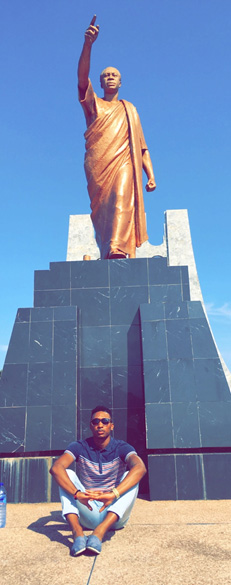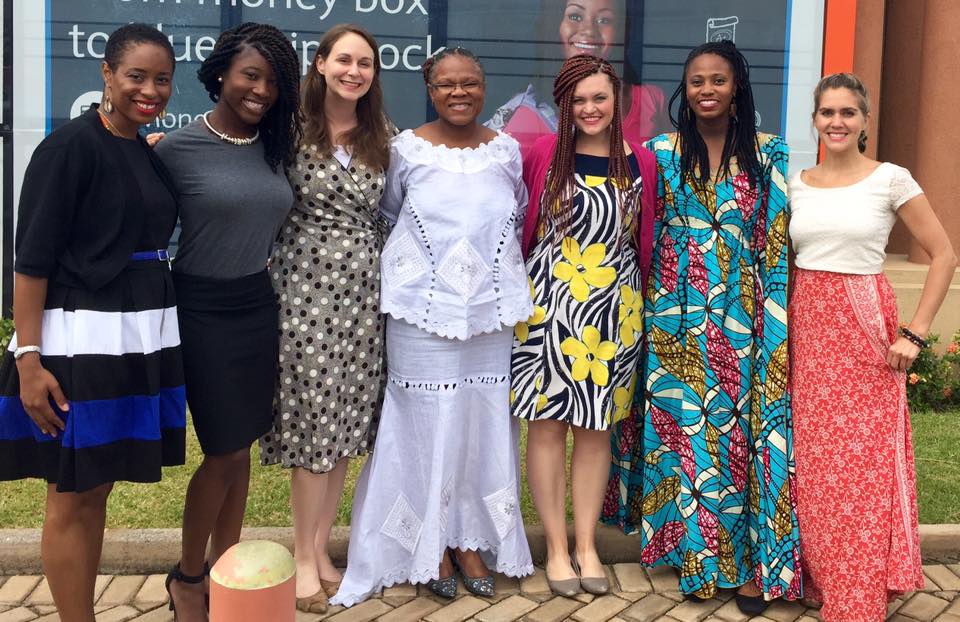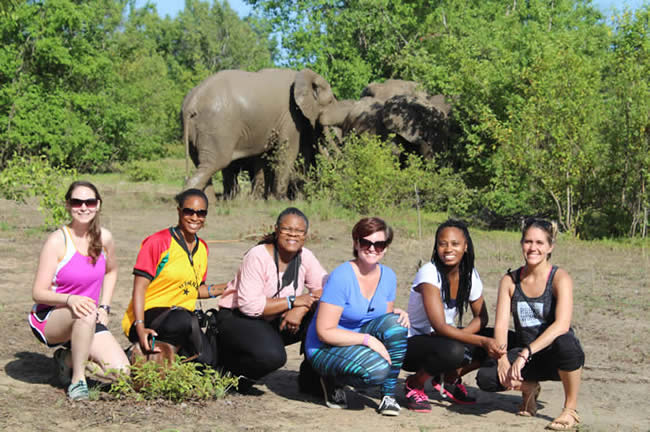Participants' Blogs
__________________________________________________________________________________
Reflections from Tyree Wright
 1. In what ways did this trip to Ghana with the GGPA exceed your expectations for fulfilling your personal project?
1. In what ways did this trip to Ghana with the GGPA exceed your expectations for fulfilling your personal project?
With my personal project being about the relations of politics in both the United States and Ghana, I have seen the involvement in local communities with the elections. I was appalled at the amount of political parties that I have been made aware of while abroad, and how serious many people in the country take elections, especially the youth in the country.
2. In what ways did this trip or events on this trip to Ghana highlight and/or connect your area of expertise?I was made aware that politically everywhere, there are and will always be faults regardless of how things may seem on the outside. Every form of government has its flaws, and there will always be room for improvement no country has a perfect form of government.
3. What did you take away personally from this trip?I personally reevaluated my life and my circumstances. I complain much less due to the fact I have many privileges that the world around me does not. I would not truly understand the significance of that unless I visited another country.
4. What is your best memory of your time in Ghana?My personal best memory was being able to reflect everyday in Elmina/ Cape Coast after a long day, of moving, sometimes being drained emotionally. To know that I was a descendant of a surviving slave through the Trans-Atlantic slave trade, and I was standing on land where many ancestors have stood. That was momentous to me and my counterparts.
Reflections from Dr. Kameelah Martin
1. In what ways did this trip to Ghana with the GGPA exceed your expectations for fulfilling your personal project?Traveling and studying in Ghana for four weeks was a phenomenal experience. I had an ambitious research project and thought I would have more than enough material to keep me occupied for four weeks of intensive study. The program exceeded my expectations in the way that the cultural immersion continually ignited more areas of interest, compounding my research with more information, research leads, points and places of interest than could reasonably be explored in four weeks. I was able to explore my general topic of folklore and cultural traditions-I was surrounded by elements of West African culture that I could easily identify and connect to African retentions in the United States. I arrived with a directed outline of the items; didactic materials that I planned to collect and research while in country. I did not plan well enough for the extraordinary amount of cultural material, sites, and information that was shared outside of that list. Particularly, our tour guide Stephen Kpogoh was walking classroom. He shared so much information and cultural context that extended beyond the already rigorous study program implemented by the project directors. He added a human element to the study, without the context and commentary of a native Ghanaian, my research and collection of materials would have been superficial. I simply could not keep up with such a wealth of information! I came away with a new list of research topics and areas of interest with which to continue my research. In the future, I hope to explore more of the natural medicine and traditional healing practices, which I discovered are also heavily retained across the Black Atlantic and the Gullah Geechee Corridor. I am also interested and look forward to learning and observing the practices of the Okomfo, or traditional fetish priests/priestesses.
2. In what ways did this trip or events on this trip to Ghana highlight and/or connect your area of expertise?Everything about the trip connects to my area of expertise and added in further developing my knowledge base in African Diaspora Studies. My primary area of expertise is literature of the African Diaspora, with particular emphasis on the US and the Caribbean regions. Studying cultural practices and the history of Ghana highlighted points of origin for a great deal of the literary and cultural expressions of African retentions in the areas most populated by enslaved Africans from West Africa. From the textiles, songs, dances, spiritual practices, and storytelling that I encountered in Ghana, I was able to connect it to some element of African Diaspora culture in the Western hemisphere. For instance, there is a striking similarity between the warrior women, Queen Mother Yaa Asantewaa, and Jamaica's national hero Queen Nanny of the Windward Maroons. Though the lived decades apart, both women identified as being Akan and fought, valiantly, against the rule of the British in their respective homelands. Kweku Anansi tales are the favorite stories of Ghanaian children and the Anglicized Aunt Nancy folktales told across the Caribbean and the United States are quite similarly adored by children. I was pleased to explore the connections between Pan-African thinkers such as Marcus Garvey, W.E.B. DuBois, and Kwame Nkrumah-I heard many tales of how Garvey's "black star" iconography made its way into the national identify of Ghana. Studying the routes and history of the Trans-Atlantic slave trade-visiting the River of the Last Bath, Elmina Slave Castle, and attending lectures on the topic-provided a deeper level of knowing and experiential learning that I can implement in all areas of my professional life. There is not a single experience that did not positively affect my professionalization as a scholar-teacher of the African Diaspora.

3. What did you take away personally from this trip?
The trip was personally rewarding on a number of levels. It was a spiritual journey back to the site from which my African ancestors were taken into captivity. Visiting the slave dungeons, standing on the other side of the Atlantic ocean, and being immersed in the culture from which so much of my own originated was a powerful and quite emotive experience. Ghana felt like home, it felt incredibly familiar. I will always cherish the time I spent there, ever grateful for the opportunity to spend time in an area of the world that I have been studying for a lifetime. It signals a professional milestone in my career-I can finally say that I can I have visited the place about which I write, teach, and discuss so passionately!!
4. What is your best memory of your time in Ghana?There are so many! I had an incredible time bonding with my fellow Fulbrighters. We will share the experience and continue to build enduring friendships. There is, however, one experience that stands above all the rest. It would have to be the time I spent in Elmina and Cape Coast-the site of enslaved Africans' departure from the continent. I'll share my journal entry as it captures the sentiment more eloquently than I can now:
May 29, 2016:
"They couldn't have known that slowly, year by year, the ocean's water would ingest a people's fury so completely that hurricanes would come each season and claim lives in recompense for Africans gone overboard" ---Daniel Black, The Coming
As I leave Cape Coast and Elmina, I am saddened to leave. The waters along this coast are indeed furious and the longer I stayed, the more I merged with that energy. We touched each other. I feeling their anger, sorrow, and dis-ease; they calming ever so slightly with the light and love and remembering I offer to this space. Now, we are ripped apart again and the sufferings--on both sides of the Atlantic--will not be assuaged.
My heart and spirit feel the ache of separation keenly. It is like I need to be here...to keep company with those old souls who will never rest. I feel an emptiness at leaving them behind. How does one work through this kind of tension? How does one leave what intuitively feels like belonging, purpose, necessity?
May 23, 2016: (After touring Elmina Castle)

I don't have the call. I don't have the response. I am still processing my experience today. Emotional doesn't quite seem to capture it. Needless to say, I cried. Wept, really. Watched my tears soak into the stone as I bent over clutching myself.
The smell is overwhelming--death, decay, feces, blood, vomit, and every other type of bodily fluid you can imagine. Centuries later, CENTURIES later the odor still penetrates you like it happened yesterday. The female dungeon---there are no words to describe that moment. Sensory overload. I removed my shoes and walked the entire tour barefoot. I needed to walk in that space as they did. I needed them to feel me as much I as felt them and to know that they were not forgotten.
I prayed. I cried. And I prayed some more.
Reflections from Rachel Hopkins
1. In what ways did this trip to Ghana with the GGPA exceed your expectations for fulfilling your personal project?Everything about this trip exceeded my expectations. I was able to see and experience first-hand how history is taught in Ghana. It was fascinating to witness events that both the United States and Ghana teach, but to be able to see the differences between the two countries really allowed for me to expand on my project. My DBQ over the Trans-Atlantic Slave Trade is going to be significantly more detailed now that I have resources from Ghana that provided me with first-hand accounts from multiple perspectives of the slave trade. However, the biggest part of the trip that went above and beyond my expectations of the trip was our tour guide, Stephen. He made sure all of our questions were answered. Any history question, cultural question, etc. Stephen made sure we had an understanding from the Ghanaian perspective. It was nice hearing from a Ghanaian and him giving his personal account of his country; he always showed us his Ghanaian pride.
2. In what ways did this trip or events on this trip to Ghana highlight and/or connect your area of expertise?My background is history. To be in a country where actions from the past helped shape the present of the country I live in was incredibly powerful. In my classroom, the slave trade and slavery is a large proponent of the curriculum. Being in one of the places where it began provided me with a different perspective that I feel will help me connect more with the information and make it more meaningful to my students. Ghanaian professors really helped me understand the African perspective of the Trans-Atlantic Slave Trade and I can't wait to share that perspective with my students.
3. What did you take away personally from this trip?I personally had an experience of a lifetime. I had been to Ghana previous to this trip, but had not seen nor witnessed some of the many places we visited. However, it was the company that helped me through this journey. To be able to experience this journey with my fellow companions of the trip made it more meaningful to me. We were all at home in Ghana; the people of Ghana welcomed us as their own. I was immersed in the culture and fell in love with the place. To top it off, we were able to meet the Asantehene. That was the greatest honor I have experienced thus far in my short life.
4. What is your best memory of your time in Ghana?I have so many memories from Ghana that I cannot just choose one. However, every favorite memory I have include my "girls" that were on the trip with me. We did everything together. We laughed, we cried, we shared, we grew. However, I think my favorite part of the trip would be our visit to Mole National Park. It is also my least favorite - baboons are a little terrifying. Aside from that, in Mole, we all went and climbed on the top of our bus and stared at the stars. We quietly processed our days that we had experienced while being in Ghana. Yet, we did it together. We became a family that weekend. Words cannot express the bond we created.

Reflections from Jacilyn Ledford

1. In what ways did this trip to Ghana with the GGPA exceed your expectations for fulfilling your personal project?
There is nothing like being able to touch what you are researching. My personal project was meant to open up curriculum at the middle school levels to incorporate aspects of culture, history, and life in past and present Ghana. Being able to visit villages and see for my own eyes, and hear with my own ears only made my personal project that much more meaningful. The trip has caused me to want to expand on what the children in our school district know about Ghana and its connections to Savannah.
2. In what ways did this trip or events on this trip to Ghana highlight and/or connect your area of expertise?
As a social studies teacher, the whole trip connected me to history in the past and how it connects to various parts of the world. I took a particular interest in the economy of Ghana, because that is my subject area of choice when teaching. When you are driving through the streets and see everyone hustling to sell their goods or services, and then you realize this is a cash based society, things get interesting. I teach about bartering and the art of markets, but seeing something so different that what i experience daily was exciting. I look forward to taking those stories and examples back to the classroom.
3. What did you take away personally from this trip?
From a personal angle, I took away the need to do more for the public orphanages in Ghana. While the current facilities seem adequate to care for the children in the orphanages, there can be more done for the advancement of the kids. In some orphanages, it seemed as if there was a shockingly high number of special needs children who needed specific cares that the country had not really adapted to. Special needs is something that we focus on here in the USA, other countries may benefit from assisting this population as well.
4. What is your best memory of your time in Ghana?
My favorite memories will always be with my Ghana group members. We became such a great family over the trip. One of the last nights we got to take a dance lesson with traditional music. We all danced and enjoyed the time, laughing at each other as we stumbled (some of us) through the song.
______________________________________________________________________________________
Visit with King Otumfuo Nana Osei Tutu II
On Friday, June 12, 2016 the participants in the GGPA had the privilege to meet with the powerful King of Ashanti, Otumfuo Nana Osei Tutu II. The participants were accompanied by Dr. Cheryl D. Dozier, president of savannah State University and Dr. William Otoo Ellis, Vice Chancellor of Kwame Nkrumah University of Science and Technology. Dr. William Oduro, Dean of International programs at KNUST, was also part of the delegation. Here are some reflections from the participants:
Memoirs of the King Otumfuo Nana Osei Tutu II Visit
Wanting to meet Asantehene immediately made my palms sweaty. We'd been prepped for weeks on the do's and don't's of seeing the King, but still! We were meeting the King. The wait drug out and zipped by all the same before we were being ushered into the meeting quarters. The room itself was regal and I knew this man was respected by all. The two ivory tusks sat on either side of his chair. When he entered the room it was electric. The dialogue was brief but everything he said was appreciated what an experience! A once in a lifetime (if you're blessed) experience.
- Ms. Jacilyn Ledford, SCCPSS Teacher
This is my second time to meet a traditional ruler. My first meeting was with a Zambian ruler in an informal setting. However, I was thrilled to see the Ashanti King for it not every person has this rare opportunity. The event was very special to me because I met a person who I would not have seen. I still remember hearing of Kotoko soccer team when I was a kid. Hardly did I know that one day I would be in Ghana and personally see the king whose value is associated with the team. I feel blessed for this occasion.
- Dr. Boniface Kawasha, SSU Associate Professor of French and Linguistics
The most memorable and remarkable moment for me occurred when King Tutu announced that Dr. Dozier, Brother Dozier and Savannah State University was a part of him and his kingdom. He committed himself to our President and the university. He also spoke highly of our university and mentioned how impressed he was with our students and faculty during his visit in 2001. He stated that, "he saw his people (Ghanaians) in Savannah, spoke of the linkage between the practice of slavery, Ghana and Savannah."
- Kojo (Dr. Adrian Anderson), SSU Assistant Professor of Social Work
The highlight of our 4-week stay in Ghana is the visit with Otumfuo Nana Osei Tutu II, King of the Ashanti Kingdom. It is important to understand the history of the Ashanti Kingdom to realize the relevance and meaning of this visit. The atmosphere in the room, the decoration and presence of the elders/advisors of the kingdom reflected the power of the kingdom. History teaches us about the bravery of the Ashanti people throughout history and their resistance to White Conquerors. The motto of the Ashanti people is as follows: "Kill one thousand of us and one thousand more will confront." Being in the palace with the king made me feel the power of the black people as reflected by the Ashanti Kingdom. I will always have a fond memory of this visit.
- Dr. Emmanuel Naniuzeyi, SSU Director of International Education
I heard Otumfuo Nana Osei Tutu II in 2001. He spoke to the SSU community, reminding us about the need to create cooperation ties between SSU and Ghanaian Universities and between the US and Ghana. 15 years slipped by and today his majesty welcomed SSU to the Manhyia Palace by reminding us we were at home. The visit today is significant that 125 years after the founding of SSU, his majesty welcomed the first lady President of SSU showering her with royal blessings. He said, "He loved SSU and hoped under Dr. Dozier, the university will rise to greatness and wished her to achieve her vision."
- Dr. Benn Bongang, SSU Department Chair of Political Science and Public Affairs
Today was amazingly indescribable. How do you share this experience? I shall try. The honor of being able to meet the Asantehene fills my heart. This visit made the trip to be able to sit in the same room with his majesty is an experience of a lifetime. To acknowledge us was even more amazing. He individually acknowledged us and thanked us for our visit. I will never target this opportunity. How many people can say they met the Asantehene? I am so grateful to Savannah State and the US Department of Education for allowing me to live this experience to the fullest. He will never be forgotten and will be lived on in my classroom.
- Ms. Rachel Hopkins, SCCPSS Teacher
I was overwhelmed by the subtle opulence of the Manhyia Palace. The sitting room where we met the Otumfuo was intimate, yet bore all the signs of royal office. I was extremely nervous about maintaining protocol. The throne was beautiful - two large elephant tusks were perched on either side of the throne - it was better than anything imagined in the movies. I instantly compacted it to how Europeans must conceive of and respond to their Monarchs. For the African Diaspora, the Asante hold such cultural significance to how and why we survived. To meet the Asantehene is an incomparable experience.
- Dr. Kameelah Martin, SSU Assistant Professor of African American Literature
When I heard in a pre-trip meeting that our group would be meeting with Otumfuo Osei Tutu, I began to realize that the Fulbright-Hays Group Project was going to offer me the chance to experience things of vastly greater significance than I had known initially. However, it was not until my arrival in Ghana that it became clear to me what a big deal it is to meet the Asantehene. To hear native Ghanaians express their desire to have the chance to meet Osei Tutu II helped me to grasp what a momentous, once-in-a-lifetime opportunity it is to meet him, and now that I have experienced this great honor I can hardly believe how blessed I am to be a part of this group. Otumfuo Osei Tutu II was so well spoken, and he seemed quite at ease meeting with us Westerners, which helped me to feel less nervous about being in his presence. I will still be processing this amazing experience for a long time to come, and I will certainly never forget it.
- Ms. Carey Bray, SCCPSS Teacher
Meeting with the Asante King (the Asantehene) was a very special and memorable experience. As an Africana Studies major, I have learned much about West African culture and the power of the Asante Kingdom. So to witness his majesty in person was an experience I'll never forget. I had the pleasure of presenting a gift from the SSU Student Body, and we also gifted him with an A Rising Magazine that I am on the cover of. To know that the Asantehene will have a piece of my university with him fills my heart with joy. He was receptive of our group that is very diverse, and he even described our President and her husband to be "more Ghanaian than he." He was truly amazing!
- Miss Ja'Andra Wheeler, SSU Student
I had an opportunity to see the Asantehene for the first time. I have seen him on the television and newspapers, but seeing him personally and speaking to him is something I will never ever forget. I had a perception that because he is a powerful king, he would not be the "easy to go" type (friendly), but from his interaction with us that mindset has been erased. It was a wonderful experience.
Salipu Hubeida